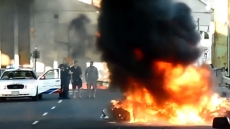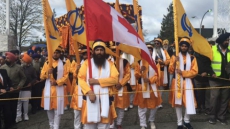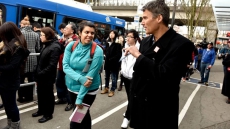VANCOUVER — Four men who orchestrated a dangerous voyage across the Pacific were out to make a profit, rather than mutually help dozens of Tamil asylum seekers, the Crown prosecutor told their B.C. Supreme Court trial.
In closing arguments at the human smuggling trial on Tuesday, Maggie Loda said the accused held a privileged position on board the MV Ocean Lady, taking part in operating the vessel, preparing the journey and helping migrants get aboard.
The rickety cargo vessel left Thailand and arrived off the coast of Vancouver with 76 Sri Lankan asylum seekers in Oct. 2009.
Francis Anthonimuthu Appulonappa, Hamalraj Handasamy, Jeyachandran Kanagarajah and Vignarajah Thevarajah are charged under a provision of the Immigration and Refugee Protection Act.
In 2015, the Supreme Court of Canada determined part of the act was too broad and unconstitutional.
The high court ordered a new trial for the men, after ruling the federal government's laws on human smuggling shouldn't apply to those who help migrants on humanitarian grounds or give aid between family members or fellow migrants.
Loda told the court that those exemptions do not apply to the four accused.
She said the exemptions were designed to protect humanitarian-minded church groups, but the law otherwise should continue to deter and penalize profit-driven human smuggling which puts migrants and Canada's borders at risk.
Loda said the accused along with a few others did the essential work such as steering or fixing the vessel's engines to get to Canada.
She said while there is no evidence the accused made money out of the scheme, they should be convicted for helping to smuggle vulnerable migrants who paid thousands of dollars to agents to bring them to Canada.
"The fact that some people at the top of the hierarchy of a scheme benefit from a profit motive ... does not eliminate the culpability of those lower in the scheme who don't benefit the same from the profit," she said.
Loda compared the profit-making scheme of smuggling asylum seekers to those trafficking drugs.
"Couriers are as integral to a drug importation scheme as are the producer and as are the drug traffickers at the street level, even if they are only paying for the rental car to cross the border."
She said financial motivation leads to more dangerous actions by creating incentives to cut corners such as putting more people on a ship, or in the example of drug trafficking, hiding more fentanyl in a vehicle.
"The driver might not see more profit, but it's a more dangerous outcome to society," she said.
Loda described the ship that came to B.C.'s shore as extremely dangerous to those on board, saying the vessel would was not designed for such a long, open-water journey and if the ship sank, at least half of those on board would die.
She said there was just one lifeboat and one life-raft on board and migrants staying in the cargo hold would not have been able to reach the vessels if the ship began to sink.
Those living in the upper deck, specifically the accused, would have been more likely to access the lifeboats, Loda told the court.
Lawyers for the accused are expected to deliver closing arguments starting on Wednesday.




